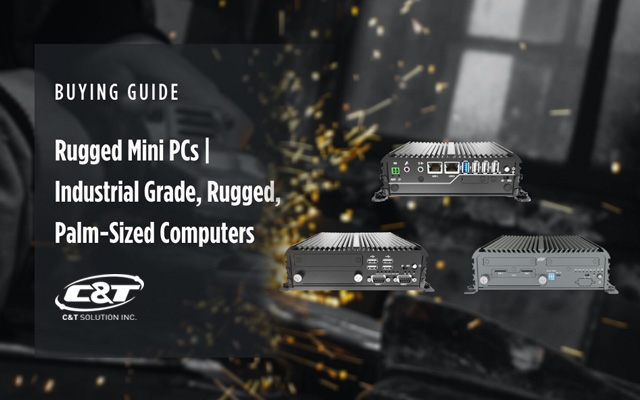Home
News&Events Knowledge Center Rugged Mini PCs | Industrial Grade, Palm-Sized Computers For Harsh IoT Deployments
Knowledge Center
28.Jan.2021
Rugged Mini PCs | Industrial Grade, Palm-Sized Computers For Harsh IoT Deployments
Rugged Mini PC
Rugged mini PCs have brought more freedom than ever to the industrial PC market. Choosing the right PC that delivers incredible performance in challenging conditions and harsh environments is crucial for it to perform the required tasks. C&T offers a wide array of fanless rugged PC solutions that are carefully designed and precisely manufactured to be deployed in the harshest and most volatile environments.What Is A Rugged Mini PC?
A rugged mini PC is a computer that is very compact and has an extremely durable design and rugged build quality that makes it ideal for deployment in volatile environments. Rugged mini-computers are significantly smaller in size and lighter in weight when compared to regular consumer-grade PCs. Not only can they fit into tight spaces, but they can also fit in weight constrained environments.
This flexibility is also supported by their extreme durability, longevity, and expandability. Regular PCs are not able to withstand these extreme environments and conditions because they aren’t designed and built to survive such stressful deployments as are rugged mini PCs, which are capable of performing very well despite all of the challenges.
This is so because they are tested and validated to operate reliably regardless of the volatility of the environment in which they are deployed. Rugged Mini PCs are fanless, ultra-durable, industrial-grade computers that have undergone various extreme tests that simulate real-life situations and resistance limits in several key areas such as extreme temperature, shock and vibration, power fluctuation, and so on.
Rugged Mini PCs utilize industrial-grade components that are strictly selected to ensure reliable performance, and such parts include capacitors, power chokes, and many other components. This will provide them with improved electrical performance and exceptional system performance.
Too Small, Too Light? - Rugged Mini PCs Vs. Desktop PCs

In the industrial automation industry, being rugged isn’t always enough; having a slim and compact design is crucial for deployments in small and tight spaces. Less space means extra room for other machine components and more efficiency. When comparing the size of a rugged mini PC with a conventional desktop PC, a rugged mini PC is considerably smaller and more compact in size.
A typical full-size desktop PC, ATX case – mid-tower type has a dimensional size of 216mm(W), 446mm(H), 470mm(D) with a volume around 45L compared to C&T’s rugged mini PC the RCO-1000 series measured the size of 150mm(W), 105mm(H), 37mm(D) with only an outstanding 0.58L in volume. It’s incredibly tiny in size compared to mainstream desktop PCs. To place things into perspective, 77 units of the RCO-1000 of C&T’s rugged mini PCs can fit into a single desktop PC.
Another considerable advantage of rugged mini PCs is that they are considerably lighter than regular desktop PCs. A desktop PC with all components installed (CPU, GPU, motherboard, fan, etc.) can easily weigh around 17kg, with a case that easily weighs 8kg and an additional fan cooling system that adds unnecessary weight.
In contrast, a fanless rugged mini PC like C&T’s RCO-1000 series weighs merely 0.85kg, resulting in a staggering 10x lighter than a desktop PC. Moreover, this rugged mini PC is noticeably smaller and lighter compared to other small form factor computers in the market today.
Furthermore, a public transportation company utilized the RCO-1000 Series of rugged computers to bring intelligence to its transportation system. The customer deployed the RCO-1000 Series of rugged mini computers in its buses, ferries, and trains to track the status and location of its transportation vehicles in order to provide commuters and passenger real-time travel information, allowing them to better plan their travel and commute.
Learn more about how the RCO-1000 Series was used to bring intelligence to a public transportation system.

Why Do Rugged Mini PCs Utilize A Fanless Design?
Rugged mini PCs are known for their fanless design, which makes them more durable and longer-lasting than regular consumer-grade desktop computers. The fanless design means there are no moving parts in the PC, which prevents common failures, especially in extreme environments.Without fans, there is no longer a need to repair or replace failed or failings fans. Since rugged mini-computers are fanless, this means there are no more venting holes, which creates a superior seal to protect the internal parts. Moreover, you can enjoy a silent PC even as they process a tremendous amount of data.
Rugged mini PCs discharge heat by utilizing the principle of conduction via the use of heatsinks. The aluminum chassis had been engineered not only as a case but also as an effective heatsink. The way it works is it adsorbs the heat produced by the CPU and internal heat-generating components and disburses it throughout the case using the conduction principle. To make this process as efficient as possible, we use metals, such as copper and aluminum to dissipate the greatest amount heat away from the system.


Temperature Resistance
Extremely hot environments and extremely cold environments are not a problem for premium rugged mini PCs. One of the most important factors when choosing a Rugged mini PC is the temperature resistance range, meaning how well it can handle deployment in environments that experience extreme temperatures. Engineers at C&T understand this challenge very well. So, they came up with the RCO-1000 series, which is an outstanding rugged mini PC in C&T’s product lineup, capable of enduring a wide range of extreme cold and heat, ranging from -25°C up to 70°C as their operating temperature. Having a wide temperature range is essential for industrial PCs to perform well, even in the most challenging environments.

Shock And Vibration Resistance
Another vital feature of rugged mini PCs is their ability to tolerate exposure to shocks and vibrations. Shocks and vibrations are one of the biggest enemies of the average computer. In fact, regular commercial computers often fail in situations where they experience sudden impacts or vibrations as some components sustain damage due to the absence of shock and vibration protection. The situation in an intense environment can be very volatile. You want your rugged mini PC to perform it’s job reliably despite being exposed to shocks and vibrations.C&T’s RCO and ACO series of rugged mini PCs can withstand up to 50Gs shock and up to 5GRMs of vibrations in compliance with the military standard MIL-STD-810G. This enables rugged mini PCs to survive in harsh environments, such as in industrial automation, transportation, military, etc. This is all due to the one-piece design and robust structure that utilizes fewer joint parts and screws for higher tolerance of shock and vibration, easy assembly, easy disassembly, and maintenance.


Dust & Water Resistance
The compact and rigid structure of rugged mini PCs allows users to position them with confidence in narrow and space-constrained environments. Therefore, the rugged infrastructure of the PC is not only capable of shielding the system from shocks and vibrations, but it can also perform smoothly, unaffected by microscopic dust particles and debris due to their highly protected sealed chassis that prevents particles from entering the enclosure, causing damage to the sensitive internal components.Furthermore, C&T’s industrial computer lineup includes waterproof systems that allow the PC to be submerged in water. Rank and certified with IP67 for dustproof and waterproof PC are what you need from an all-in-one PC like the WCO series in C&T’s PC line up. Some rugged mini PCs come with anIP67 rating, making the system dustproof and waterproof with up to 1 meter of submersion.

Longevity And Versatility
The cableless design and wide voltage range with overvoltage protection (OVP) make rugged mini PCs more reliable and versatile. The cableless design is cleaner and prevents cabling signals degradation and latency. Also, with no moving parts it reinforces the durability of the PC. Furthermore, motherboards are designed in a way that prevents them from bending when exposed to shocks and vibrations. The elimination of cables from the system eliminates the risk of cables coming loose from their connections when exposed to shocks and vibrations. Moreover, the cableless design eliminates the possibility of tangled cables that could cause the system to stop operating properly. Wide voltage input capability coupled with OVP (overvoltage protection) adds more versatility for the input to cover all kinds of power input scenarios. Mini rugged PCs have a power input range that ranges from 9V up to 50 VDC in addition to OVP mechanism to prevent high input voltage above 55V from damaging the sensitive internal components of the system.
Wireless Network Platform
Rugged mini PCs can be set up with various Wi-Fi and Cellular features. For Wi-Fi connectivity, rugged mini PCs support the latest Wi-Fi 6 that delivers 40% faster data transfer speed than the current Wi-Fi 5. Hence, offering high bandwidth and low latency performance for a reliable, rugged mini pc.Moreover, to add more flexibility, rugged mini pc also can be equipped with cellular connection like 4G, LTE, and 5G. The theoretical top speed for Wi-Fi 6 is 9.6 Gbps, and 5G has a top theoretical speed of up to 10 Gbps, providing an ultra-fast data transfer speed that is extremely crucial for isolated deployments where reliable internet connectivity is the main challenge. Additionally, rugged mini PCs can be configured with Bluetooth connectivity despite of having a slower speed than Wi-Fi. Bluetooth is perfect for simple single and multiple device connectivity.

Versatility And Customizability With I/O
When looking for a rugged industrial computing solution, you should look for an option that has all the functions and features that are desired. Industrial PCs can last for years and provide a long-term solution. Thus, you want an expandable PC where it can still support your custom changes in the future. For example, Rugged PCs that C&T offers have a wide array of I/O ports that you can customize according to your specific requirements. From serial ports, independent display ports, digital I/O and general-purpose I/O, USB port type A, PoE/multiple-Lan RJ45 up to M12 connectors are available in the rugged PC’s I/O ports. These many ports are backed up with a universal bracket and two full-size mini PCIe to increase the expansion capability. C&T engineers also came up with a reverse protection design to prevent wrong polarity power input from damaging the internal system caused by human error.


